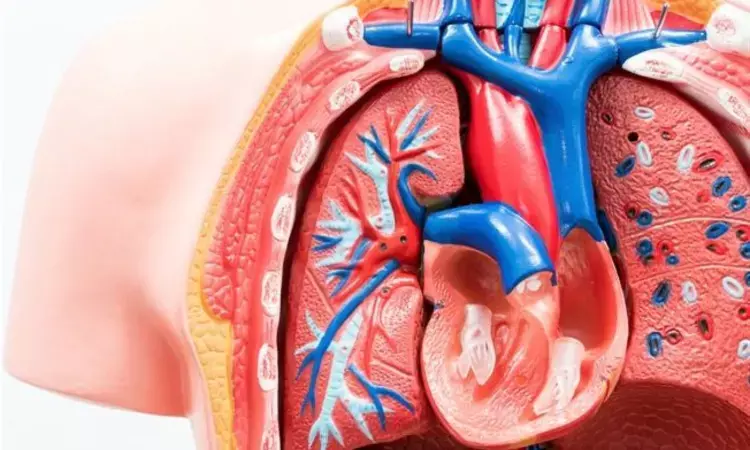- Home
- Medical news & Guidelines
- Anesthesiology
- Cardiology and CTVS
- Critical Care
- Dentistry
- Dermatology
- Diabetes and Endocrinology
- ENT
- Gastroenterology
- Medicine
- Nephrology
- Neurology
- Obstretics-Gynaecology
- Oncology
- Ophthalmology
- Orthopaedics
- Pediatrics-Neonatology
- Psychiatry
- Pulmonology
- Radiology
- Surgery
- Urology
- Laboratory Medicine
- Diet
- Nursing
- Paramedical
- Physiotherapy
- Health news
- Fact Check
- Bone Health Fact Check
- Brain Health Fact Check
- Cancer Related Fact Check
- Child Care Fact Check
- Dental and oral health fact check
- Diabetes and metabolic health fact check
- Diet and Nutrition Fact Check
- Eye and ENT Care Fact Check
- Fitness fact check
- Gut health fact check
- Heart health fact check
- Kidney health fact check
- Medical education fact check
- Men's health fact check
- Respiratory fact check
- Skin and hair care fact check
- Vaccine and Immunization fact check
- Women's health fact check
- AYUSH
- State News
- Andaman and Nicobar Islands
- Andhra Pradesh
- Arunachal Pradesh
- Assam
- Bihar
- Chandigarh
- Chattisgarh
- Dadra and Nagar Haveli
- Daman and Diu
- Delhi
- Goa
- Gujarat
- Haryana
- Himachal Pradesh
- Jammu & Kashmir
- Jharkhand
- Karnataka
- Kerala
- Ladakh
- Lakshadweep
- Madhya Pradesh
- Maharashtra
- Manipur
- Meghalaya
- Mizoram
- Nagaland
- Odisha
- Puducherry
- Punjab
- Rajasthan
- Sikkim
- Tamil Nadu
- Telangana
- Tripura
- Uttar Pradesh
- Uttrakhand
- West Bengal
- Medical Education
- Industry
Mechanical Valves Offer Survival Advantage Over Bioprosthetic Valves in Younger Aortic Valve Replacement Patients: JACC

USA: A recent study published in the Journal of the American College of Cardiology has provided valuable insights into the survival outcomes of bioprosthetic versus mechanical aortic valve replacement (AVR) in patients aged 40 to 75 years, offering critical information for patient and healthcare provider decision-making regarding the choice of prosthetic valves.
The researchers revealed that in patients aged 60 years or younger undergoing surgical aortic valve replacement, mechanical valves offer a survival benefit compared to bioprosthetic valves. However, despite this advantage, the use of mechanical valves has been steadily declining, according to the analysis of over 100,000 patients.
Previous observational studies have highlighted the advantages of mechanical valves over tissue valves for middle-aged patients. However, the need for lifelong anticoagulation therapy, along with other concerns, has made these valves less appealing. Additionally, several studies released last year have shown a growing trend of offering transcatheter aortic valve implantation (TAVI) to younger patients. To inform clinical practice, Michael E. Bowdish, Department of Cardiac Surgery, Smidt Heart Institute, Cedars-Sinai Medical Center, Los Angeles, CA, and colleagues aimed to assess contemporary, real-world long-term outcomes of aortic valve replacement using data from the Society of Thoracic Surgeons Adult Cardiac Surgery Database (STS-ACSD).
For this purpose, the researchers identified all patients who underwent primary isolated bioprosthetic or mechanical AVR. They excluded patients aged under 40 and over 75 years, as well as those with endocarditis, emergency or salvage status, shock, an ejection fraction of 25% or lower, and any prior cardiac surgery. A validated methodology was used for linking patient data to the National Death Index, to define longitudinal all-cause mortality between 2008 and 2019.
The researchers performed robust risk adjustments through age-specific inverse probability weighting and applied restricted cubic splines to model non-linear age relationships. Sensitivity analyses were conducted by excluding cases of pure aortic insufficiency, intermediate or high-risk patients (STS >4%), and discontinued valve types.
Key Findings:
- A total of 109,842 patients underwent either bioprosthetic (94,125) or mechanical (15,717) aortic valve replacement (AVR) during the study period.
- After risk adjustment, mechanical valves showed greater freedom from all-cause mortality than bioprosthetic valves up to the age of 60.
- Age-specific analyses revealed that mechanical valves were associated with lower all-cause mortality across all age groups aged 60 years or younger.
- These findings remained consistent in all sensitivity analyses conducted.
The study revealed that in patients aged 60 years or younger, mechanical aortic valve replacement was linked to a survival benefit after adjusting for risks, compared to bioprosthetic AVR.
"These 12-year survival data provide important insights to guide shared decision-making between patients and healthcare providers when choosing prosthetic aortic valves," the researchers concluded.
Reference:
Bowdish ME, Mehaffey JH, Chang S-C, et al. Bioprosthetic vs mechanical aortic valve replacement in patients 40-75 years. J Am Coll Cardiol. 2025; Epub ahead of print.
Dr Prem Aggarwal, (MD Medicine, DNB Medicine, DNB Cardiology) is a Cardiologist by profession and also the Co-founder and Chairman of Medical Dialogues. He focuses on news and perspectives about cardiology, and medicine related developments at Medical Dialogues. He can be reached out at drprem@medicaldialogues.in


